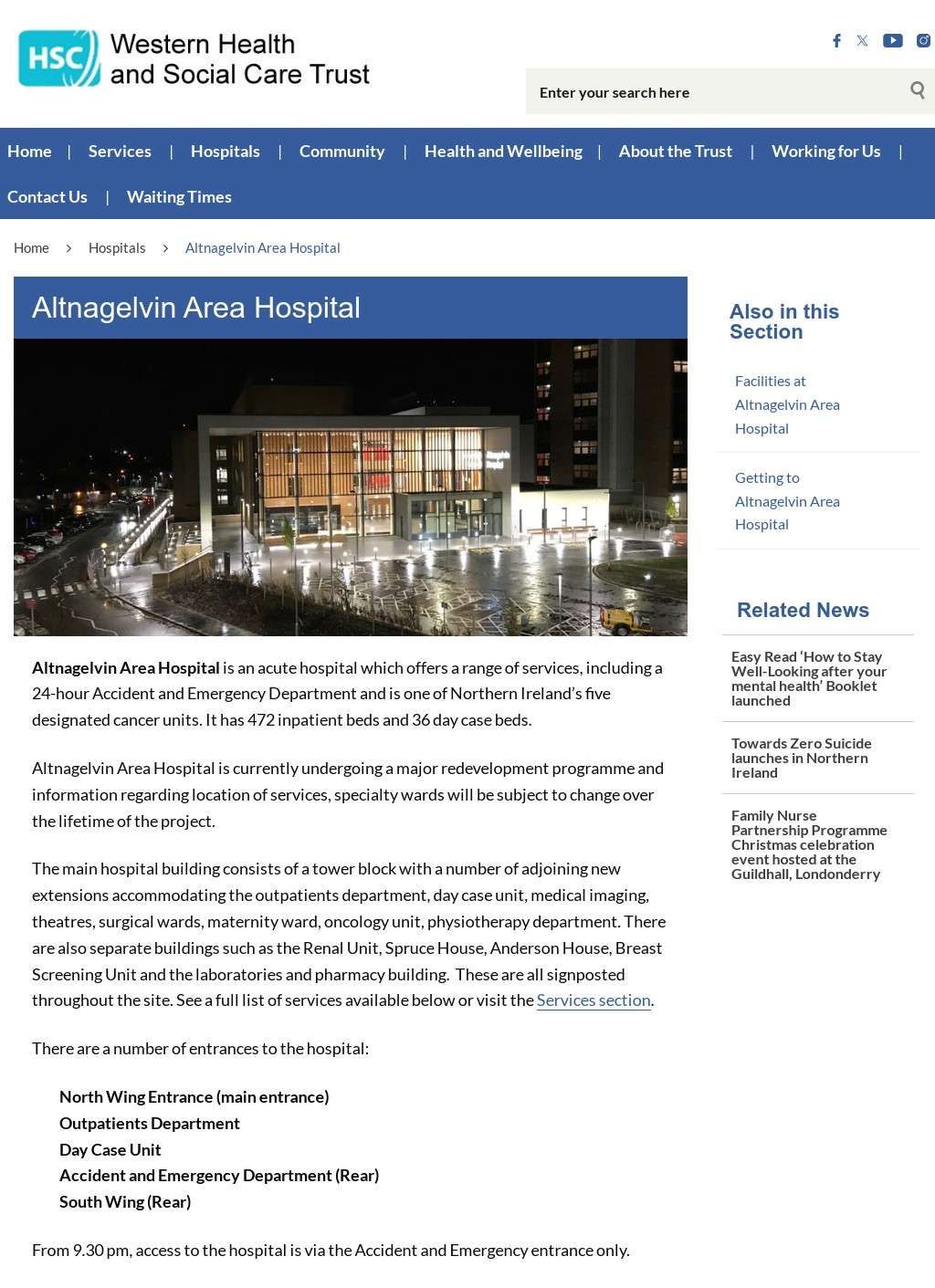Altnagelvin Area Hospital represents a cornerstone of healthcare provision in Northern Ireland's northwest region, serving as the primary acute care facility for Derry~Londonderry and the surrounding counties. Located on Glenshane Road in the Waterside area of the city, this major hospital holds the distinction of being the first significant hospital constructed in the United Kingdom following World War II, opening its doors in 1960. Today, it functions as a vital component of the Western Health and Social Care Trust, delivering comprehensive medical services to a catchment area that extends beyond Northern Ireland's borders into neighbouring County Donegal.
The hospital's infrastructure encompasses 472 inpatient beds and 36 day case beds, supporting a vast array of medical specialties and services. The main building consists of a distinctive tower block complemented by modern extensions housing various departments. Recent years have seen substantial investment in facilities, including state-of-the-art outpatient departments, surgical theatres, a dedicated oncology unit, and specialised treatment centres. The ongoing redevelopment programme continues to modernise and expand the hospital's capabilities, ensuring it meets contemporary healthcare standards and growing demands.
Emergency and acute care services form the backbone of Altnagelvin's operations. The 24-hour Emergency Department handles thousands of cases annually, from minor injuries to major trauma. As one of Northern Ireland's designated major trauma centres, the hospital maintains specialist teams and equipment to manage the most severe cases. The department operates triage systems to prioritise patients based on clinical need, supported by adjacent acute assessment units that provide rapid diagnosis and treatment for urgent medical conditions.
Cancer care represents a particular area of excellence, with Altnagelvin designated as one of Northern Ireland's five specialist cancer units. The hospital provides comprehensive oncology services including chemotherapy, radiotherapy planning, and supportive care. The Macmillan Health and Wellbeing Campus on site offers holistic support for cancer patients and their families, combining clinical services with psychological support, complementary therapies, and practical assistance. Multidisciplinary teams coordinate treatment plans, ensuring patients receive integrated care throughout their cancer journey.
Maternity and neonatal services cater to families across the northwest region. The maternity unit delivers thousands of babies annually, offering both midwife-led and consultant-led care options. Specialist facilities include delivery suites, a neonatal intensive care unit, and antenatal clinics. The hospital promotes choice in childbirth while maintaining high safety standards. Their neonatal unit provides expert care for premature and sick newborns, equipped with advanced monitoring and life-support systems.
Surgical services span numerous specialties, from routine procedures to complex operations. The hospital's theatre suites incorporate modern technology enabling minimally invasive techniques alongside traditional surgery. Specialties include general surgery, orthopaedics, urology, gynaecology, and ENT procedures. Pre-operative assessment clinics ensure patients are optimally prepared for surgery, while dedicated recovery areas and surgical wards provide post-operative care. The day surgery unit enables many procedures to be completed without overnight stays.
Medical specialties address the full spectrum of adult health conditions. The hospital maintains specialist units for cardiology, respiratory medicine, gastroenterology, neurology, and elderly care. The stroke unit provides rapid assessment and treatment for cerebrovascular events, incorporating thrombolysis services and rehabilitation support. Diabetes services include both inpatient management and extensive outpatient programmes supporting patients with this chronic condition. The renal unit offers dialysis services for patients with kidney failure.
Diagnostic services underpin clinical decision-making across all departments. The radiology department provides comprehensive imaging from basic X-rays to advanced MRI and CT scanning. Laboratory services operate round-the-clock, processing thousands of blood tests, biopsies, and other samples daily. Cardiac investigations, neurophysiology studies, and endoscopy suites enable detailed internal examinations. These diagnostic capabilities ensure rapid and accurate diagnosis, essential for effective treatment planning.
Critical care facilities support the hospital's sickest patients. The intensive care unit provides one-to-one nursing for patients requiring mechanical ventilation, complex monitoring, and organ support. High dependency units offer enhanced care for patients needing close observation but not full intensive support. These units employ highly trained staff and sophisticated equipment, managing patients following major surgery, severe illness, or significant trauma.
Rehabilitation services help patients regain independence following illness or injury. Physiotherapy departments work across the hospital, from intensive care mobilisation to outpatient exercise programmes. Occupational therapists assess and support patients' return to daily activities, while speech and language therapists address communication and swallowing difficulties. The Spruce House neurological rehabilitation unit provides specialist programmes for patients recovering from brain injuries or neurological conditions.
Mental health services integrate with physical healthcare throughout the hospital. Liaison psychiatry teams support patients experiencing psychological difficulties alongside physical illness. Specialist services address areas like eating disorders, self-harm, and the mental health needs of older people. The hospital recognises the interconnection between mental and physical wellbeing, ensuring holistic approaches to patient care.
Research and education activities position Altnagelvin as a teaching hospital contributing to medical advancement. Clinical research trials offer patients access to innovative treatments while contributing to medical knowledge. The hospital hosts medical students, nursing students, and trainees across allied health professions. Continuous professional development programmes ensure staff maintain cutting-edge skills and knowledge.
Support services enhance the patient and visitor experience. Voluntary organisations provide invaluable assistance through hospital shops, tea bars, and befriending services. Chaplaincy services offer spiritual support regardless of faith background. Patient advocacy ensures individuals' voices are heard in their care planning. Car parking facilities, though often stretched, include designated disabled spaces and drop-off areas. Public transport links connect the hospital to the wider community, with regular bus services stopping at the hospital grounds. The Trust continues to invest in Altnagelvin's future, recognising its vital role in regional healthcare provision. Plans include further service expansion, technology upgrades, and infrastructure improvements. As healthcare needs evolve with an ageing population and advancing medical capabilities, Altnagelvin Area Hospital adapts to meet these challenges while maintaining its position as the northwest's premier healthcare facility.
